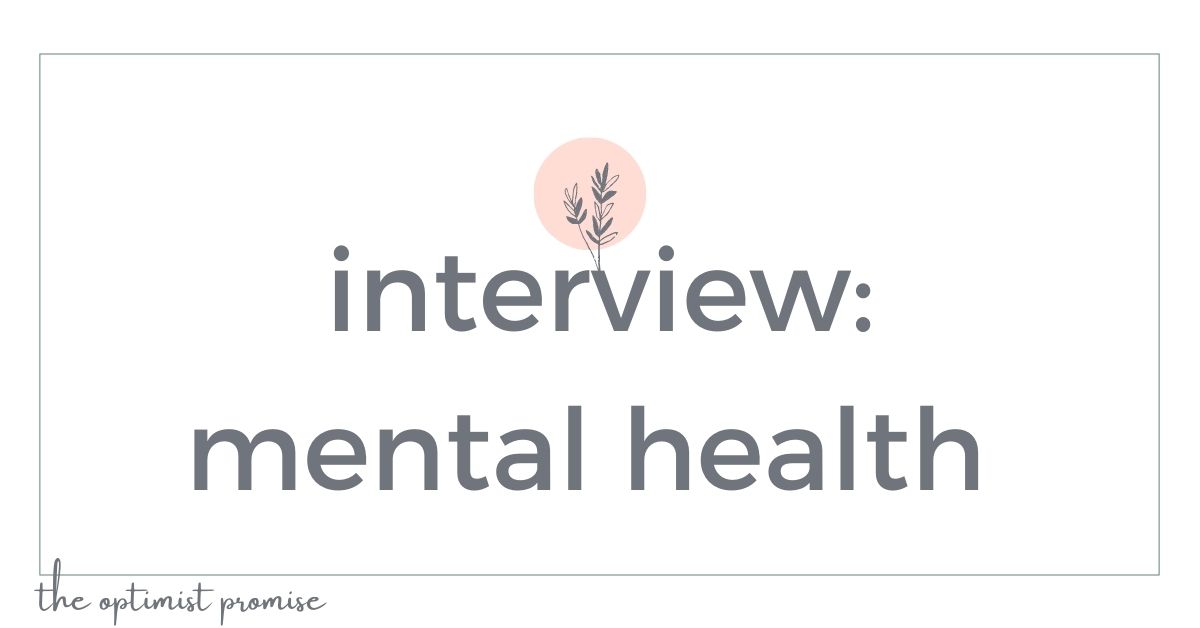Happy National School Psychology week! To help celebrate and raise awareness for the mental health crisis, I interviewed school psychologist, Courtney Stearns about anxiety, depression and tips for coping.
Disclaimer: If you or someone you know is in crisis/thinking about dying by suicide, it is extremely important to get help IMMEDIATELY. Call 911 or the National Suicide Prevention Lifeline at 1-800-273-TALK (8255) or text “HOME” to 741741 to the Crisis Text Line. The Lifeline is free, confidential, and you do NOT have to be suicidal to call/text the Lifeline.

Well, I’ve got to start off saying happy National School Psychology week! The work that you do to help students thrive cannot go unnoticed.
Kylie Plonske, owner of The Optimist Promise
Q: Can you tell me a little bit about what you do as a school psychologist?
A: Thank you! As a school psychologist, I am trained in a variety of areas. I consult with families, teachers, and other school professionals to support students academically, behaviorally, and socially/emotionally. Additionally, I work directly with special education staff, families, and students. I am passionate about data and school-wide systems-level work. In addition, I provide mental health services to students as needed.
Q: How did you become a school psychologist? What ages do you work with?
A: I attended UW-Eau Claire for both my undergraduate and graduate degrees. Graduating with a Bachelor of Science in Psychology with a Diversity Minor, I then went on to attend the School Psychology Graduate Program. I am currently serving as the school psychologist at Whitehall School District in Whitehall, WI. I work with families, teachers, other school staff, and students ages 3-21. If you’d like more information about school psychology, feel free to visit:

Although I only work with children and adolescents professionally, I am excited to collaborate with The Optimist Promise to increase general mental health awareness and share knowledge and sources in this area!
Q: What have you seen changing in the realm of mental health crisis from this pandemic we’ve all been subject to?
A: The pandemic definitely impacts mental health. I and those in the area in my profession have seen an increase in mental health needs and crises. Obviously, the pandemic isn’t entirely to blame, but it contributes to the extra stress and anxiety many are feeling right now! This is especially relevant for anyone that had mental health challenges before the pandemic began.
Q: Do you have advice for those feeling lonely and in need of a little social interaction?
A: Good question! Remember that while we have to “physically distance,” there is no need to “socially distance!” It is so important to connect with friends and family using other ways (phone call, text, video call, outdoor activities, etc.). For people in a mental health crisis, this is essential. It’s easy to fall into a cycle of isolation/no social interactions. I’d also like to provide an example of how people might be “reinforced” for isolating kinds of behaviors.
- Example: a teenager with depression hasn’t left her bedroom all weekend. On Sunday, she decides to hop on a zoom call with friends. She gets ready for the call, but as she’s opening her laptop in the living room, she decides she doesn’t want to attend. She goes back to her room. Her parents knock on her door and ask her if there is anything they can do for her, and console her by saying “It’s okay, you don’t have to go if you aren’t feeling up to it!”, and “We will make your favorite dinner tonight”.
In this example, the teenage girl’s avoidance behavior is being reinforced in two ways:
- First, her avoidance behavior is being reinforced because she doesn’t attend and the social situation is removed (this is called negative reinforcement).
- Second, her avoidance behavior is reinforced because she is showered with support and affection from her parents when she decides she’s too depressed to attend (positive reinforcement) (note: this isn’t to say parents shouldn’t be loving and supportive of their children with depression).

In general, individuals with depression often experience reinforcement for their depressive behaviors and even punishment for their healthy behaviors. While their depressive behaviors may result in attention from others and successful avoidance of an undesired event, their healthy behaviors (or attempts to engage in healthy behaviors) are often ignored.
To summarize, it’s so important to stay socially active and find connections with others, especially during these challenging times! It’s also important to be mindful of your loved one’s behaviors and to be sure to encourage them to participate in healthy behaviors.
If it seems to be more than loneliness or lack of social interaction, it is important to seek additional help. One pathway to this can be to have an honest conversation with your doctor or care provider.
Q: Are there tips that you have for managing anxiety in an anxiety-provoking situation?
A: Yes, there are some quick/easy ways to help manage this. Here are some strategies I practice with kids/adolescents, but they also apply to adults! I have used these strategies too. The more you practice them, the less awkward it feels to do!
Mental Health Tip 1: Deep Breathing
A: The first strategy is deep breathing. The first step is to take a slow breath in through your nose (for about 4 seconds). Next, hold your breath for about 1-2 seconds. Then, exhale slowly through your mouth (over about 4 seconds). After that, wait for 2-3 seconds and then take another deep breath. You can do this for about 5 to 10 breaths or until you feel better and less anxious or nervous.

Mental Health Tip 2: Muscle Relaxation
- First, get as comfortable as you can wherever you are. Sit back, put both feet on the floor, and close your eyes.
- The next thing to do is pretend you are squeezing a ball hard in your hands. Squeeze for a little bit and then drop the ball and relax. Now, stretch out your arms and shoulders. Stretch them out and pretend you are reaching down for something but can’t move the rest of our body.
- Squeeze these muscles for a little while and then relax. Next, look down and raise your shoulders to squeeze your neck muscles. Again, hold it and then release your muscles.
- After that, we pretend you are barefoot on the beach and press your feet into the sand and use your legs to help push your toes into the sand further.
- Squeeze your leg and feet muscles for a bit and then relax. Now feel all the muscles in your body go limp and feel relaxed.
Other simple strategies include listening to calming music, getting a drink of water, taking a brief walk, etc.
For more coping strategies, please see:
- Suicide Prevention Lifeline
- Managing Stress & Anxiety
- Supporting Your Emotional Wellbeing During the COVID-19 Outbreak
- ADAA tips
Q: What should you do if you or a friend/family member is in crisis or considering suicide?
A: If you or someone you know is in crisis/thinking about dying by suicide, it is extremely important to get help IMMEDIATELY. Call 911 or the National Suicide Prevention Lifeline at 1-800-273-TALK (8255) or text “HOME” to 741741 to the Crisis Text Line. The Lifeline is free, confidential, and you do NOT have to be suicidal to call/text the Lifeline.
- One common myth is that asking someone about suicide will make them more likely to attempt/die by suicide. This is NOT true. Research suggests asking may actually decrease suicidal ideation. It is important to directly ask important questions. Be there for them and listen to their answers. Some of these key questions include:
- Have you wished you were dead or wished you could go to sleep and not wake up?
- Have you actually had any thoughts about killing yourself?
- Do you have a plan to do this? Do you intend to carry out the plan?
*See the “Community Card for Friends and Family” or the “Community Card for Parents” from the Columbia Protocol for more information and steps to take based on the answers to these questions.
Q: How might someone tell if someone they love is in crisis but suffering in silence? Is there anything they can do in this type of situation?
A: There are some important risk factors and warning signs that someone is in significant distress or thinking about dying by suicide.
Risk Factors of Mental Health Crisis:
- Feeling depressed or hopeless
- Deliberate self-injury
- Prior suicidal thinking or behavior
- Knowing family or friends that have attempted or died by suicide
- Loss of an important relationship
- Being isolated or alone
- Trauma or abuse
- Drug and alcohol use
Warning Signs of Mental Health Crisis:
- Suicidal threats, both direct (“I want to die”) and indirect (“I wish I could go to sleep and not wake up”)
- Suicide notes, plans, and social media posts
- Making final plans, giving away favorite things
- Preoccupation with death
- Changes in behavior, sleeping, eating, appearance, thoughts and/or feelings
- Extreme mood swings, rage, withdrawal
- Sudden unexplained happiness (could be relief of having a plan)
In this situation, a friend or family member can ask the key questions above to determine how significant the risk is. If it is an emergency situation, do not leave the person alone, and call 911 or the Lifeline. If not emergent, still listen and empathize, and encourage them to seek additional support.
Q: Can you tell me a little bit about the cycles of a mental health illness?
A: Yes, mental health disorders often run in cycles! For example, someone may suffer from depression/anxiety for 2 weeks, and then for the next 2 weeks, they begin to do better. This PDF helps explain in more detail part of the cycle that depression can have:
Q: Anything else you’d like to add?
A: I would like to add that no matter your profession or responsibilities during this time, self-care is SO important. I’m not always great at this, and my work-life balance is a work in progress, so I understand this can be challenging.
Also, I just want to thank you for involving me in this collaboration! These topics are close at heart to me and I appreciate the opportunity to share this with you!
Courtney Stearns, School Psychologist
Additional Resources for mental health crisis:
- For more information about what to do for a friend/family member in crisis, you can also visit #BeThe1To and read the 5 action steps for communicating with someone who may be suicidal.
- Suicide is currently the leading cause of death for school-age youth. Here is information on preventing youth suicide.


Leave a Reply